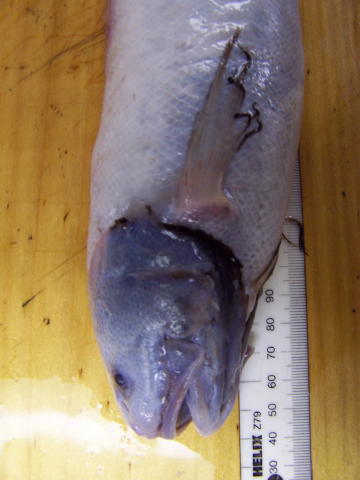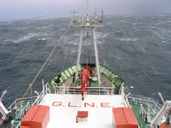Benthic Crozet – 20/12/2005
Dreaming of a green Christmas: seabed snowstorms and monster
catches!!
By Ben Wigham
So far we have all been expecting (and hoping!)
that this M5 station will have
a much higher input of food to the deep-sea floor than our
next destination at M6. We have
all seen the fabulous satellite images of the phytoplankton
blooms to the north of the Crozet Islands (see news on 4/12/2005)
but when the phytoplankton die, or are fed on, would the prevailing
currents carry enough of the sinking detrital material to
the seabed at M5? If so, will
the supply of all this food be reflected in the number and
types of animals we see in our trawl catches?
The recovery of the FRESP
and ROBIO landers has provided us with the evidence we
were after, both the video and photographs show large amounts
of phytodetrital ‘fluff’ gathering in dense green
patches on the seafloor. In fact the amount of green fluff
in the water was perhaps even more than we might have expected,
with big clouds of this ‘marine snow’ drifting
past the camera. These deep-sea snowstorms were often so intense
that it was difficult to see the FRESP fish trap though the
fluff. Only 5 days to Christmas and we are getting the snow
we wanted, if only the weather at the surface could be so
good!!!

ROBIO sea floor shot – notice the
green phytodetritus

15 fish attack the bait on the FRESP lander!
A clue to the high abundance of deep-sea fish at Crozet.
 Fish in FRESP trap (above) and later,
obscured by a marine snow storm (phytodetritus)
Fish in FRESP trap (above) and later,
obscured by a marine snow storm (phytodetritus) |
Investigating
the contrast in the seabed habitats and animal assemblages
between our 2 stations is an essential part of the Crozet
project. We have now seen that our current site at M5
does indeed have a very high supply of phytodetrital
material to the seabed. The sinking phytoplankton remains
will then provide food for a wide range of animals.
The OTSB trawl provides us with the best
means of collecting animals from the seabed to study
their abundance, biomass and diversity. The fishing
skipper had already produced two excellent hauls, with
a wide range of both fish and invertebrate species,
some new and others old friends from the many trawl
samples taken by NOC and Aberdeen University in the
North Atlantic (see news on xx/12/2005). |
However, the last haul onboard surpassed everything
that went before it with a monster catch that took us the
best part of a day to sort and process. Dr. Dave Billett of
the DEEPSEAS Group has been going to sea for the best part
of 30 years and has seen many of the weird and wonderful things
the deep-sea can offer up, yet even he was amazed by the sheer
number and diversity of animals in this haul. “At these
abyssal depths the large animals are often dominated by the
holothurians” says Dave, “however, the sheer number
of different species in this one haul is astounding, certainly
the best I have witnessed in my career at sea!” A clearly
happy fishing skipper went to take a deserved rest saying
“Dave has been asking me for big one for many years,
I was only too happy to oblige on this occasion!”
 Holcomycteronus brucei? Possibly
only the second ever specimen recovered
Holcomycteronus brucei? Possibly
only the second ever specimen recovered |
|
It was not
only the sea-cucumbers that had Dave’s mouth watering,
the catch also provided us with large numbers of sea-spiders
(pycnogonids), polychaetes and asteroids (seastars)
in addition to 27 species of fish. Nikki King of the
University of Aberdeen’s Oceanlab explained that
the fish catch was equally astounding with several specimens
of rare fish. “We always expected to see high
numbers of the abyssal grenadiers at this site but their
biomass alone was twice that of the other two trawl
catches.” says Nikki, “What was exciting
for us was the collection of fantastic intact specimens
of some potentially very rare fish, records indicate
that some of these fish have only been caught once or
twice before”.
It would be nice to think that all the
green snow we have seen in the video and photographs
is providing all the food and nutrients to support this
large seabed community. However, there is still a long
way to go and we wait to see what lies in store for
us at the M6 station but the first pieces of the jigsaw
are falling into place. |
 |